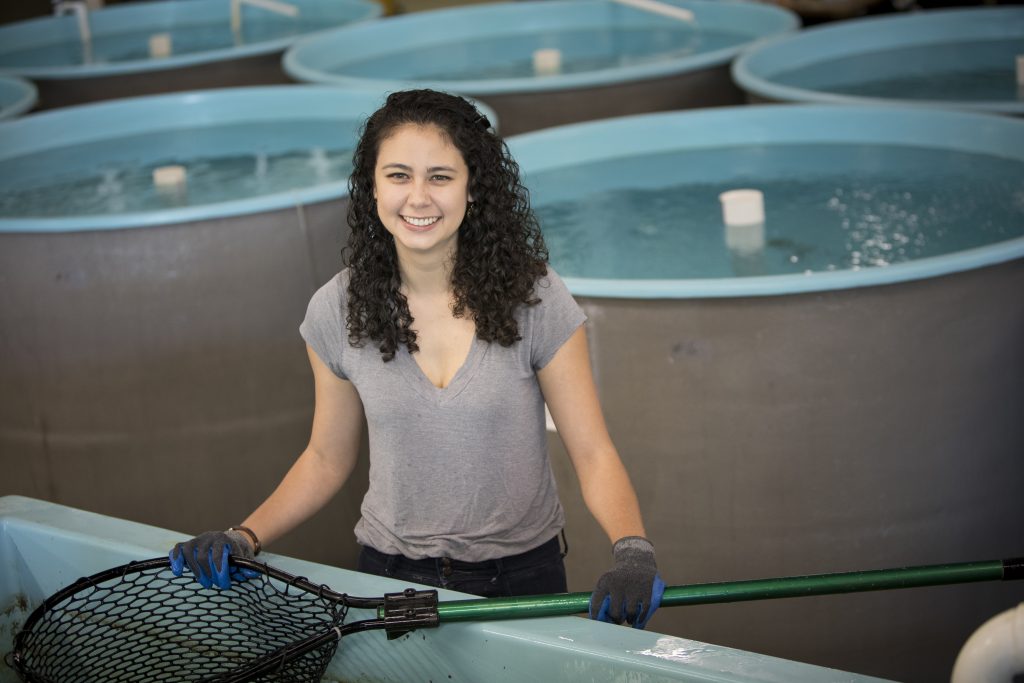
Dr. Gail Schwieterman: Thriving Under Stress
I honestly didn’t intend to become a professor. When I was applying to colleges, I knew that I loved animals, but didn’t have much direction besides that. As cliché as it may sound, a semester studying abroad changed everything. I had always joked that I was good at school, so I wished I could do school for a career, but it never clicked that this was an actual option until I was working alongside Ecuadorian professors collecting data on sea lion abundances and coralline algae coverage. I had caught the research bug, and was excited about these new career goals. Upon returning to the states with this newfound direction, I only had one semester of college left, and was stumped on how to gain the experience necessary to pursue my growing dream of being a professor. I was fortunate enough to land paid internships at Woods Hole Oceanographic Institute, Hatfield Marine Science Center, and Mote Marine Lab, which helped expose me to a wide variety of projects on everything from crab diets to shark post release mortality. These research experiences were critical in building my CV and making me a competitive applicant for graduate school.
I knew I didn’t want to rush into grad school, and I applied for the Thomas J. Watson Fellowship in my final semester of college. This fellowship is unique in that it emphasizes experiential learning in the pursuit of personal growth over traditional deliverables (I was explicitly forbidden from collecting data). The fellowship markets itself as stepping off of the academic escalator, and accelerating your personal growth through placing yourself in unfamiliar situations. My project centered on exploring how different cultures and industries think about and interact with marine resources. I spent four months working with conservationists and artisanal fishers in Costa Rica, four months working with education and conservation groups in Hong Kong, and five months working with ecotourism companies in South Africa. I was forbidden from returning to the States during this year, and was not allowed to stay with anyone I knew before the fellowship began. At the time, it was the hardest thing I had ever done, but through the process of the fellowship, I gained a much deeper sense of who I am as a person, and gained confidence in my ability to do anything I put my mind to.
The fellowship also reaffirmed my decision to pursue research as a career. Although I worked with amazing individuals in a variety of sectors, nothing sparked my curiosity like attending an international conference focused on elasmobranch biology. Upon returning from my fellowship, I spent a year working on grant and manuscript writing for my former research mentor while also applying to graduate school. I ended up at the Virginia Institute of Marine Science, William & Mary where I focused on understanding coastal elasmobranch responses to hypoxia and other stressors. I had the opportunity during my degree to work alongside incredible researchers, with a highlight being spending a season in Moorea working on neonatal sharks.
I was set to finish my PhD in May of 2020, and was finishing up my dissertation when Covid-19 hit the east coast. I submitted my dissertation to my committee on March 15th, and Virginia went into a stay-at-home lockdown the next day. I had devoted the past five years to this degree, and now it was unclear if I’d ever be able to use it. I had applied to a few different postdoctoral fellowships, some through my network (some as cold emails to people I admired) but all had been indefinitely suspended as financial uncertainty wracked the higher education system. I spent that summer working an hourly position at Petco and playing with my newly adopted dog, and tried not to stress about my non-existent career in academia.
Fortunately, after months of silence, I heard that I had been selected for a postdoctoral fellowship at the University of California Santa Barbara. I would not be able to do my proposed project due to covid-19 restrictions, but I packed up my life and headed to the west coast anyway. I ended up being part of an incredible lab where I learned new techniques and refined my ability to ask questions regarding fish cardio-respiratory systems. Looking back, it is almost comical that my post-doc advisor who would go on to become a close friend and mentor, was someone I only interacted with via zoom for the entire duration of my fellowship.
From UCSB, I completed a second postdoctoral fellowship at Carleton College, where I gained experience in curriculum development, pedagogical best practices, and undergraduate research mentoring. These experiences helped balance my CV, but I found I missed being part of a community that worked on similar systems and questions. When I saw the tenure track position for a Marine Physiologist at the University of Maine, it seemed like a dream job.
Now, I am working on establishing the Schwieterman Lab at the University of Maine in the School of Marine Sciences. It’s been a huge learning curve, but I’m excited to bring my expertise in ecological physiology to the contemporary marine resource management challenges in Maine. By investigating the mechanisms driving individual level responses to anthropogenic stressors, my lab will be able to enhance our understanding of species-specific responses to things like rising temperatures and ocean acidification, while also improving our ability to predict how environmental variability can affect populations’ ability to thrive. I have brought on several amazing graduate students who are asking questions regarding human impacts on marine species in ways that are pushing me to expand my own pool of knowledge, while also helping to build a network of people interested in similar questions across Maine and New England. I’m excited at the wealth of potential Maine offers for my research program, and I am eager to contribute to the UMaine MARINE goal to make Maine a global leader as a marine state.

